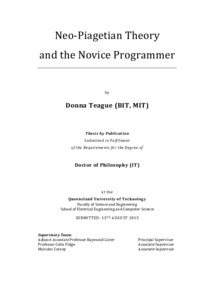Neo-Piagetian Theory and the Novice Programmer |

|
 Diese Seite wurde seit 1 Jahr inhaltlich nicht mehr aktualisiert.
Unter Umständen ist sie nicht mehr aktuell.
Diese Seite wurde seit 1 Jahr inhaltlich nicht mehr aktualisiert.
Unter Umständen ist sie nicht mehr aktuell.
 Zusammenfassungen
Zusammenfassungen
 The purpose of this research is to understand why so many students find learning to
program difficult. I studied novice computer programmers in (close to) their natural
environment at university. This research provides evidence that the development
of programming skills can be described using the neo-Piagetian cognitive
development framework. While others have used classical Piagetian theory to talk
about learning to program, the neo-Piagetian framework has not previously been
used empirically to study programming behaviour. Understanding how novices
develop programming skills will enable educators to better assist those who
struggle to learn programming. As neo-Piagetian theory is not age-specific, this
research informs not only tertiary pedagogy, but teaching and learning of computer
programming in any setting.
The purpose of this research is to understand why so many students find learning to
program difficult. I studied novice computer programmers in (close to) their natural
environment at university. This research provides evidence that the development
of programming skills can be described using the neo-Piagetian cognitive
development framework. While others have used classical Piagetian theory to talk
about learning to program, the neo-Piagetian framework has not previously been
used empirically to study programming behaviour. Understanding how novices
develop programming skills will enable educators to better assist those who
struggle to learn programming. As neo-Piagetian theory is not age-specific, this
research informs not only tertiary pedagogy, but teaching and learning of computer
programming in any setting.A longitudinal study which forms part of this thesis shows that the development of programming skills is sequential and cumulative. Novice programmers pass through at least three stages: sensorimotor, preoperational and concrete operational. An overlapping waves model of development was adopted to explain concurrent manifestation of two of those stages. The most mature stage, formal operational, was not considered in depth in this thesis.
I completed both qualitative and quantitative data analysis. The qualitative data was from novice programmers thinking aloud as they completed programming exercises. The quantitative data was collected from in-class testing of entire cohorts of introductory programming students. An analysis of this triangulated data has identified the behaviours of sensorimotor and preoperational novices in contrast to the more mature concrete operational novices.
It was found that sensorimotor and preoperational reasoning behaviours are evident in novices very early in semester. Further, even by the end of that first semester, many students had not yet reached the concrete operational stage.
This research explains why some students have a hard time learning to program. It is not because they are not smart enough; not because they do not have a "geek gene"; and not because programming is an intrinsically difficult subject. Programming competence requires abstract reasoning skills, and learning to program is about the sequential and cumulative development of those abstract reasoning skills in an unfamiliar domain. This thesis identifies the manifestations of each of the early stages of development in the programming domain. That information will enable educators to (a) identify the developmental stage of their students, (b) provide stage-appropriate learning resources and (c) assist students in transitioning to the next more mature stage of reasoning.
 Diese Doktorarbeit erwähnt ...
Diese Doktorarbeit erwähnt ...
 Personen KB IB clear | Alireza Ahadi , Mordechai Ben-Ari , Jens Bennedsen , Susan Bergin , Jerome S. Bruner , Michael E. Caspersen , Benedict du Boulay , David Ginat , Anabela Jesus Gomes , Jeff Kramer , Catherine Lang , Sue Lewis , Colleen M. Lewis , Raymond Lister , Judy McKay , António José Mendes , George Miller , John Monk , Tim O'Shea , Seymour Papert , Roy Pea , Ronan Reilly , Anthony Robins , Carsten Schulte , Elliot Soloway , Jim Spohrer , Lew Semjonowitsch Vygotsky | |||||||||||||||||||||||||||||||||||||||||||||||||||||||||||||||||||||||||||||||||||||||||||||||||||||||||||||||||||||||||||||||||||||||||||||||||||||||||
 Aussagen KB IB clear | Programmieren ist schwierig | |||||||||||||||||||||||||||||||||||||||||||||||||||||||||||||||||||||||||||||||||||||||||||||||||||||||||||||||||||||||||||||||||||||||||||||||||||||||||
 Begriffe KB IB clear | Fehlvorstellungen / misconceptions
, Fehlvorstellungen beim Programmieren
, Formal-operatives Denkenformal operational stage
, Konkrete Operationen concrete operational stage
, Konstruktionismusconstructionism
, Konstruktivismusconstructivism
, notional machine
, Novicenovice
, Präoperationales Stadiumpreoperational stage
,  Programmieren Programmieren programming
, Sensumotorisches Stadium
, SOLO-Taxonomie
, Stadien der kindlichen Entwicklung nach PiagetPiaget's theory of cognitive development programming
, Sensumotorisches Stadium
, SOLO-Taxonomie
, Stadien der kindlichen Entwicklung nach PiagetPiaget's theory of cognitive development
| |||||||||||||||||||||||||||||||||||||||||||||||||||||||||||||||||||||||||||||||||||||||||||||||||||||||||||||||||||||||||||||||||||||||||||||||||||||||||
 Bücher |
| |||||||||||||||||||||||||||||||||||||||||||||||||||||||||||||||||||||||||||||||||||||||||||||||||||||||||||||||||||||||||||||||||||||||||||||||||||||||||
 Texte |
|
 Diese Doktorarbeit erwähnt vermutlich nicht ...
Diese Doktorarbeit erwähnt vermutlich nicht ... 
 Nicht erwähnte Begriffe | Advanced Beginner, Competent, Fehlvorstellungen bezüglich Schleifen, Fehlvorstellungen bezüglich Variablen, Proficient, Programmierkonzepte |
 Tagcloud
Tagcloud
 Zitationsgraph
Zitationsgraph
 Zitationsgraph (Beta-Test mit vis.js)
Zitationsgraph (Beta-Test mit vis.js)
 Zeitleiste
Zeitleiste
 1 Erwähnungen
1 Erwähnungen 
- WIPSCE '23 - The 18th WiPSCE Conference on Primary and Secondary Computing Education Research (Sue Sentance, Mareen Grillenberger) (2023)
- A Haptic Programming Language Based on Neo-Piagetian Theory (Anja Marx) (2023)


- A Haptic Programming Language Based on Neo-Piagetian Theory (Anja Marx) (2023)
 Volltext dieses Dokuments
Volltext dieses Dokuments
 |  Neo-Piagetian Theory and the Novice Programmer: Gesamtes Buch als Volltext ( Neo-Piagetian Theory and the Novice Programmer: Gesamtes Buch als Volltext ( : :  , 10181 kByte; , 10181 kByte;  : :  2021-03-21) 2021-03-21) |
 Anderswo suchen
Anderswo suchen 
 Beat und diese Dissertation
Beat und diese Dissertation
Beat hat diese Dissertation während seiner Zeit am Institut für Medien und Schule (IMS) ins Biblionetz aufgenommen. Beat besitzt kein physisches, aber ein digitales Exemplar. Eine digitale Version ist auf dem Internet verfügbar (s.o.). Es gibt bisher nur wenige Objekte im Biblionetz, die dieses Werk zitieren.







 Biblionetz-History
Biblionetz-History